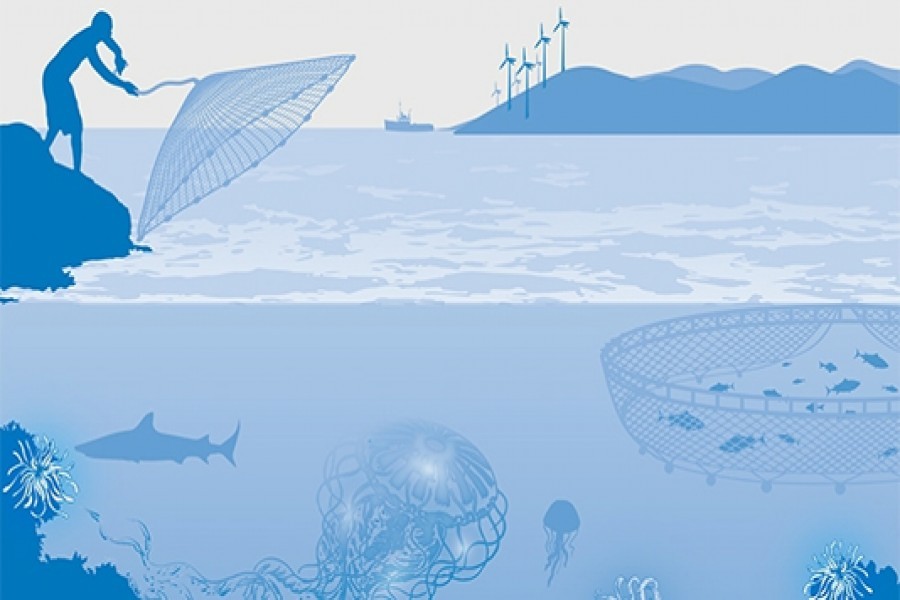The government's move for creating a data bank on blue economy is not progressing well. The concerned ministries, divisions and agencies are not in a position to provide required data on a regular basis. Besides, they are even failing to submit the progress reports of works done.
The government's Blue Economy Cell (BEC), according to a FE report last week, asked all relevant ministries, divisions and agencies to provide required information on blue economy including work plan, latest reports on progress of implementation and others.
The first meeting on blue economy was held in 2014 in order to take up strategic action plan for the ministries, divisions and agencies concerned. A 25-member Coordination Committee on Sea Resources Exploration and Fair Management was formed in the meeting. It took a number of decisions. But most of the decisions could not be implemented as yet.
Blue economy goes beyond viewing the ocean solely as a mechanism for economic growth. It also focuses on the sustainability of oceanic resources for economic growth. Therefore, blue economy encompasses ecological aspects of the ocean along with economic aspects.
The delimitation of sea boundary with Myanmar and India really opened up a new window of opportunities in terms of harnessing blue economy resources and enhancing external trade. It is mined for minerals (salt, sand, gravel, copper, cobalt etc can be found in the deep sea) and drilled for crude oil and gas. These elements together constitute blue economy.
After a lengthy battle in the court with Myanmar and India, the country did achieve its full maritime area. Such an achievement did encourage the government to extract untapped resources from the blue economy.
The Bay of Bengal is the largest among 64 bays in the world and 1.4 billion people live along its coastline in Bangladesh, India, Myanmar and Thailand. At least 26 maritime activities can be generated here which include fishery, shipping, maritime trade, energy, seabed tourism etc.
Analysts, however, say the concept of the blue economy is complex and it will take time to develop human resources and technological capacity to discover marine resources. It conceptualises oceans and seas as 'Development Spaces' where spatial planning integrates conservation, sustainable use of living resources, oil and mineral wealth extraction, bio-prospecting, sustainable energy production and marine transport.
The government has recently set up Bangladesh Institute of Marine Technology (BIMT) and initiated study of oceanography at two public universities to carry out research in the Bay of Bengal. There were only two marine academies in the country in 2009, the number rose to 22 in 2017.
Even after all these efforts, the country's drive for exploring oil and gas is running at a snail's pace. Recently, state-run Petrobangla has finalised a draft of the model production sharing contract (PSC) to launch a fresh bidding round for onshore and offshore energy exploration.
The draft of the PSC was sent to the Power and Energy Ministry for its final approval. Unlike the past several biddings, Petrobangla is expected to offer both onshore and offshore blocks to international oil companies (IOCs) for exploration of oil and gas.
Severe natural gas crisis coupled with the commencement of expensive LNG (liquefied natural gas) and insufficient output from the previous offshore bidding rounds have prompted the state-run oil, gas and mineral corporation to go for 'aggressive' hunt of hydrocarbon. Currently, some 26 offshore blocks and over a dozen onshore blocks have remained unexplored.
The outcome of the latest three bidding rounds, exclusively for offshore blocks, however, did not bring any expected results for the country as the IOCs could not make a single commercial discovery of hydrocarbon.
Meantime, bureaucratic tangles caused substantial delay in drilling of four exploratory wells under Rupkalpa-3 at a cost of Tk 383 billion. The government allowed state-owned Bangladesh Petroleum Exploration and Production Company Limited (Bapex) to drill four exploratory wells (Kasba-1, Madanganj-1, Jamalpur-1 and Sailakupa-1) between July 2016 and June 2018. But the company could not complete the works as yet.
Energy experts see ensuring sustainable primary energy, reducing over-reliance on fuel import and checking corruption as major challenges of Bangladesh's power and energy sector. They say the new government should expedite oil and gas exploration, utilise local coal, and ensure efficient use of energy to develop the sector.
The Bay of Bengal remains the least explored area for gas potential, so far. The western part (India) and the eastern part (Myanmar) of the Bay have discovered significant natural gas reserves in the past decade. Geological studies suggest that Bangladesh can have significant gas resources in the onshore and offshore belts which are yet to be discovered.
The seabed of Bay of Bengal is home to a rich core of solidified natural gas known as 'Diamond' or 'gas hydrates.' However, the country is yet to use the right kind of technology to extract petroleum at such a depth.
The country is now heavily dependent on onshore fields for gas output, with production hovering around 2,700MMCFD as against a demand for over 3,300MMCFD. To meet the growing energy demand and depleting onshore energy reserve, the country recently has concentrated on exploring the blue economy resources and gas reserve in the Bay of Bengal.
Bangladesh, in such a situation, has to go all-out to harness the potential of the blue economy through applying latest technological know-how which critically emerges as a dire necessity for the country.


